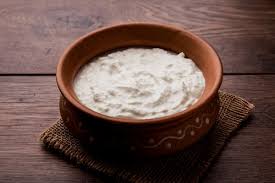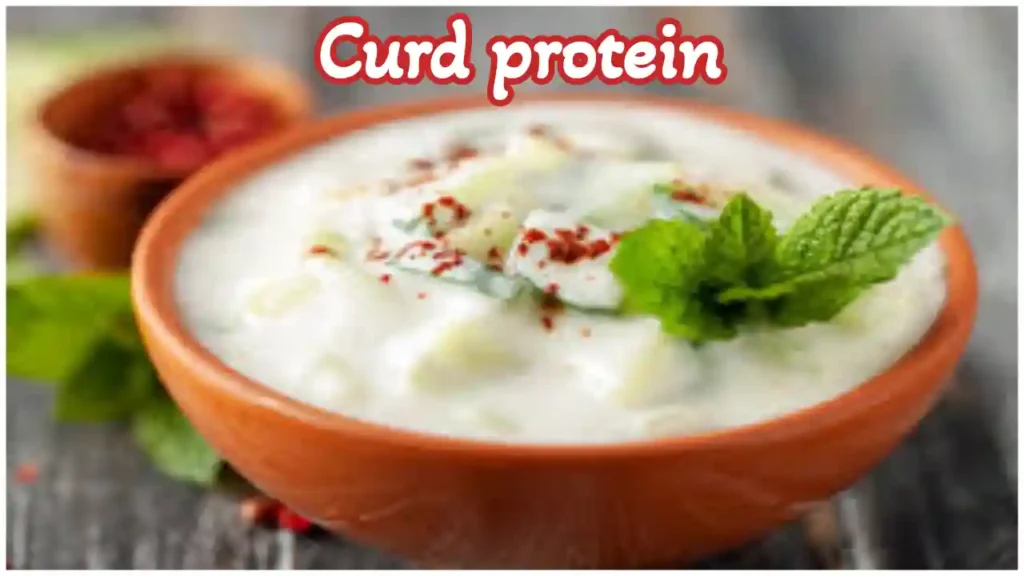Curd is called a powerhouse of nutrients. Due to which there are many benefits of eating curd. Consuming it daily gives many benefits to the body. At the same time, the effect of curd is cold, which not only keeps your stomach cool. But also keeps you away from diseases caused by stomach heat. Curd is a dairy product and dairy products are considered beneficial for health. If you eat curd protein per 100g daily, then the body gets many health benefits.
Consuming curd helps in controlling obesity and cholesterol. Along with this, it is helpful in keeping you away from many other diseases. Yogurt is a traditional Indian dairy product, which is prepared by naturally fermenting milk. It contains good bacteria (lactic acid bacteria) that ferment the milk and make it thick and sour.
It is sweet and sour in taste and is considered extremely beneficial for the body. Yogurt is rich in protein, calcium, vitamin B12 and probiotics. It helps in improving digestion, increasing immunity and improving skin. In India, yogurt is used with food, in raita, lassi, kadhi and many traditional dishes.
Related:- 18 Benefit of anjir

Curd protein per 100g (Nutrients)
Curd contains protein, carbohydrates, sugar, calcium, iron, magnesium, phosphorus, potassium. And sodium, zinc, copper, selenium, fatty acids in abundance. Along with this, vitamin-C, vitamin-A, vitamin-B6. And vitamin-B12, vitamin-B, vitamin-K, vitamin-D are found in good quantities in it. Due to which eating a bowl of curd daily provides many benefits.
| Nutrition | Per 100g |
| Protein | 11 g |
| Potassium | 225 mg |
| Carbohydrates | 4.7 g |
| Calcium | 350 mg |
| Calories | 98 kcal |
| Phosphorus | 144 mg |
| Magnesium | 17 mg |
| Folate | 13.9 mcg |
| Sodium | 364 mg |
| Fiber | 0 mg |
| Selenium | 2.2 mg |
| Niacin | 0 mg |
| Fat | 3.3 g |
| Sugar | 4.7 g |
| Iron | 1.3 g |
| Vitamin | A, B, C, D, K |
15- Benefits of Curd protein per 100g
The probiotics present in curd protein per 100g, promote good bacteria, which improves intestinal health. It gives relief in problems like constipation, gas, obesity, hair fall. And indigestion etc. Let’s know 15 main benefits of curd.
Curd improve digestion
The probiotics found in curd, which improve intestinal health. It helps in digesting food easily and removes problems like constipation. Eating curd daily reduces the complaint of acidity and gas and strengthens the entire digestive system.
Boost immunity (Curd protein per 100g)
The lactic acid bacteria present in curd protein per 100g are helpful in increasing the immunity of the body. Regular consumption gives the body the power to fight infections. It is especially beneficial in preventing cold, cough, flu and viral.
Makes the skin glowing and shiny
The lactic acid present in curd removes dead cells of the skin and makes it clean and soft. Using it as a face pack makes the skin glowing and hydrated. It helps in reducing wrinkles and slowing down the aging process of the skin.
Natural conditioner for hair
Curd nourishes the hair and makes it soft naturally. The proteins and vitamins present in it strengthen the hair roots. And reduce the problem of dandruff, hair fall and split ends. Massaging the head with curd cools the scalp.
Helpful in weight loss
Curd protein per 100g is low in calories and high in protein, which helps in weight loss. It keeps the stomach full for a long time, which reduces hunger. Also, it increases metabolism, which speeds up the fat burning process.
Makes bones strong (Curd protein per 100g)
Curd is a good source of calcium and phosphorus. Which are essential for strengthening bones. It helps in preventing bone-related diseases like osteoporosis. Regular consumption of curd keeps bones and teeth healthy.
Keeps the heart healthy
The good fats and probiotics present in curd help balance cholesterol. It controls blood pressure and reduces the risk of heart diseases. Low-fat curd is considered especially beneficial for the heart.
Beneficial in diabetes (Curd protein per 100g)
Probiotic in curd helps control blood sugar levels. It improves insulin sensitivity and is beneficial for type 2 diabetes patients. Plain curd without sugar can be safely consumed in diabetes.
Reduce stress and improve mood
The probiotics found in curd affect the neurotransmitters of the brain, which improves mood. It is helpful in reducing anxiety and stress. Research suggests that there is a direct connection between the intestines and the brain, which yogurt balances.
Beneficial for women
Curd helps in balancing women’s hormones. And helps in preventing urinary tract infection (UTI). It maintains good bacteria in the vagina, which provides protection from infection. Consumption of curd during menstruation cools the body.
Calms burning sensation of the stomach
Curd protein per 100g calms the internal heat of the body during the summer season. It gives relief in problems like burning sensation in the stomach, ulcers and acidity. Consumption of buttermilk or curd keeps the digestive system cool. And also keeps the body hydrated in summer.
Boost energy (Curd protein per 100g)
Vitamin B12 and riboflavin present in curd help in energizing the body. It removes fatigue and gives strength to the muscles. Eating curd helps the body recover quickly, especially after exercise or physical exertiion.
Relief from constipation
The lactic acid bacteria in curd improve intestinal movement. Which makes the stool come out easily. It is a natural remedy to relieve constipation. Regularly eating curd makes bowel movements regular and the stomach feels light.
Useful in skin infections and sunburn
The antibacterial and antifungal properties present in curd. That provide relief in skin infections like pimples, itching and irritation. It provides cooling effect to the sunburnt skin. Applying curd directly on the skin provides quick relief from irritation and redness.
Teeth become stronger
The calcium and phosphorus in curd strengthen the teeth and prevent tooth decay. Also, it keeps the bacteria in the mouth balanced and reduces bad breath. Curd protein per 100g is very beneficial for teeth for children and the elderly.

How to eat curd
Curd is a nutritious and healthy food, which is considered an integral part of Indian food. It is not only wonderful in taste, but also strengthens the digestive system. But it is important to know the right way to eat curd so that all its benefits can be availed. Let’s know how and when curd should be eaten.
Right time to eat curd
It is considered best to eat curd during the day. Especially including it in lunch is beneficial for digestion. Eating curd at night can have a cooling effect, which can cause cold and cough. If it is necessary to eat curd at night, then eat it by adding black pepper or trikut powder in it.
What to eat with curd
Curd protein per 100g can be eaten with rice, paratha or puri. It makes the meal balanced and digests heavy food easily. You can eat curd by adding a little rock salt, cumin powder or black pepper, which increases both its taste and digestibility.
What do not eat with curd
Never eat fish, onion or sour fruits with curd. As it increases the risk of toxins being formed in the body. Also, curd and milk should not be eaten together, it is considered forbidden in Ayurveda.
Do not eat extremely fridge curd
Eating too cold curd can slow down the digestion process and cause cold and cough. Always eat fresh and room temperature curd.
Do not eat curd on an empty stomach
Eating curd on an empty stomach in the morning can sometimes cause acidity and gas problems. It is better to eat curd with food or in small quantities.
Eat with honey
Eat by mixing black salt, ground roasted cumin, mint, or a little honey in curd. This increases both its taste and medicinal properties. In summers, sweet curd can also be eaten by adding sugar to curd.
Make buttermilk and rayata from curd
Curd can be drunk by making buttermilk, which gives coolness in summer and prevents dehydration. Raita made from curd can also be taken with the meal like cucumber raita, boondi raita or mint raita.
Curd VS. yogurt
Both curd and yogurt are fermented foods made from milk, which are considered extremely beneficial for health. Although they look similar but there are many important differences between the two. Such as the method of preparation, nutritional elements, taste and health benefits. Let’s know what is the difference between curd and yogurt.
Curd:- Curd is traditionally made at home by curdling milk or adding curdling agent. In this, a little old curd is mixed with milk at normal temperature and it is kept to set. Bacteria grow in it in an uncontrolled manner. Curd contains many naturally grown bacteria, but they do not always survive. Curd has a slightly sour taste and a loose texture.
Yogurt:- Yogurt is made from special types of bacteria like Lactobacillus bulgaricus and Streptococcus thermophilus. It is fermented at controlled temperature and in a clean environment, due to which its quality remains stable. Yogurt contains live and active probiotic bacteria that are extremely beneficial for intestinal health and digestion. Yogurt is usually creamy, thick and smooth.
How much protein has curd
Curd is a nutrient-rich and healthy food made by fermenting milk. It is considered a good source of protein. Usually, 100 grams of ordinary (full-fat or toned) curd contains about 3.5 grams to 4.5 grams of protein. If the curd is prepared from skimmed milk, then the amount of protein in it can be slightly higher up to 5 grams. Greek curd or hung yogurt (from which water has been removed) contains even more protein. Which can be about 8 to 11 grams per 100 grams.
It is especially beneficial for those who want to build muscle or take a high protein diet during weight loss. The protein present in yogurt is “casein” is digested slowly and provides energy to the body for a long time. Apart from this, probiotics, calcium and vitamin B are also found in abundance in curd, making it beneficial for overall health. Therefore, consuming curd regularly is an easy and tasty way to provide the body with the required proteins.
Side effects of curd
Curd is also considered very beneficial for health. But there are as some disadvantages of eating curd. Let us know what are the disadvantages of eating curd.
- Curd is sour, due to which consuming it can increase your joint pain.
- Sometimes consuming it can cause gas and bloating problems.
- Curd is rich in protein, which can cause problems for uric acid patients.
- Curd helps in reducing weight, but consuming it in excess can increase your weight.
- Consuming curd in excess can lead to constipation.
- Curd should not be consumed at night. This can increase indigestion, acid reflux and heartburn.
Curd protein per 100g related FAQs
Ans. Yes it is generally good to eat curd every day. Curd is a rich source of probiotics, which beneficial in intestinal health and digestion.
Ans. Curd has a cooling effect on body temperature. It has a cooling effect and helps balance body heat, especially in hot weather or in conditions like acidity or heartburn.
Ans. Yes, curd may be beneficial for acidity and gas-related problems. It contains lactic acid bacteria, which can improve digestion and reduce symptoms of acidity and gas.
Ans. Curd is generally safe to consume and does not cause any significant side effects for most people. However, some individuals may be intolerant or allergic to dairy products, including curd.

